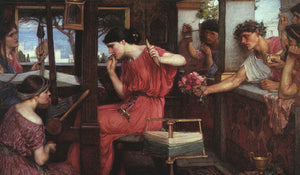Shrouds and their symbolism - The Odyssey
Shrouding the dead has acquired a rich amount of symbolism throughout history. In various cultures and rituals, this act has been interpreted in its own way, leading to many different meanings. Every week we share a story from the rich cultural history of the shroud.
Shrouds in the Odyssey
In Ancient Greece, as all over the world throughout antiquity, fabrics were a valuable material because it was labor-intensive to make. Being able to weave was seen as a sign of good upbringing. In the Odyssey, which is one of the most famous works of the Greek poet Homer, along with the Iliad, there is a character named Penelope. While waiting for her husband to return home after the Trojan War, she uses the fact that she is weaving a shroud as a way to keep suitors at bay. The shroud was supposed to be for her father-in-law, and she told the suitors that she would choose one of them as her new husband when the shroud was finished. However, during the night she took the weaving apart again, so that this moment never came. This story shows how a shroud is a sign of fidelity and piety in ancient Greek tradition.



